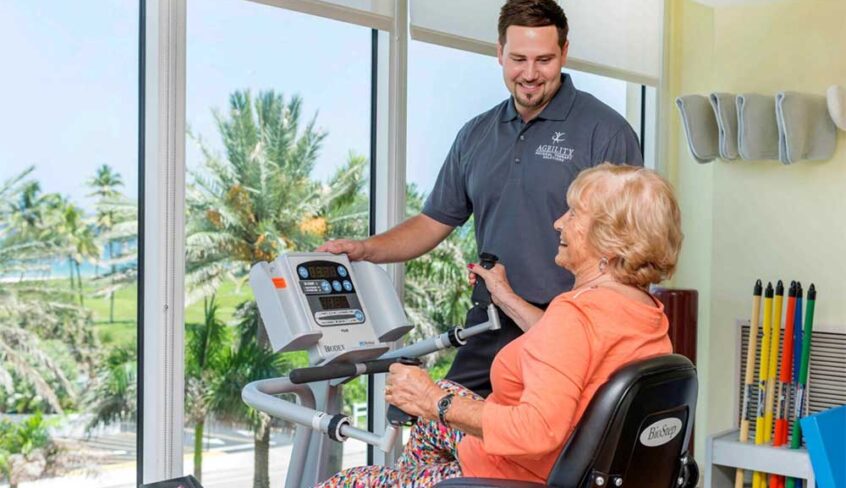<!–[CDATA[The benefits of exercise are present throughout the various stages of life, no matter age, gender, or physical ability. Exercise not only helps people maintain a healthy weight, it can also reduce anxiety, aid with sleeping more soundly and improve overall mood. All are challenges people with Alzheimer’s experience.
If you or a loved one has Alzheimer’s disease, exercise can have a host of additional benefits for both the body and the mind. Symptoms of mild to moderate Alzheimer’s disease include low energy, coordination and balance issues, anxiety or depression and difficulty sleeping. The introduction of a regular exercise routine can help to combat the negative effects of some of these symptoms.
Exercise as Therapy
According to WebMD, “repetitive exercises such as walking, indoor bicycling, and even tasks such as folding laundry may lower anxiety in people with the disease because they don’t have to make decisions or remember what to do next. They also can feel good knowing that they’ve accomplished something when they’re finished.”
And that’s not all–researchers at the Wake Forest School of Medicine found that exercise also has a positive impact on the brains of people with Alzheimer’s. Participants in the study had all been diagnosed with mild cognitive impairment or diabetes, which has been known to raise the risk of developing Alzheimer’s disease. Some of them were assigned to work out at community gyms where they would be supervised for about an hour of aerobic activity or stretching, four times a week for 6 months.
At the end of the study, researchers had determined that “exercisers had better blood flow in the memory and processing centers of their brains and had measurable improvement in attention, planning, and organizing abilities referred to as executive function.”
Scientists also made sure to mention that these findings were important because there are currently no medications on the market that can duplicate the positive impact that exercise has on the brain.
Safe Exercises for Alzheimer’s
Since exercise can greatly benefit adults who have been diagnosed with Alzheimer’s, finding those types of exercise your loved one will be safe doing is important. Talk to your primary care physician about:
- Walking. Either outside with a loved one or on a treadmill with supervision, walking 30-45 minutes every day can have the desired effect. If continuous exercise is challenging at first you can break up the walking into mini-sessions instead.
- Chair Yoga. Chair yoga takes you through a series of yoga poses while using a chair for stability. It’s been proven to help improve balance in people with Alzheimer’s disease. A combination of stretching and breathing exercises, Chair Yoga is great for improving flexibility, coordination, balance and relaxation.
- Ride A Stationary Bike. Simple, repetitive movements are ideal for people living with Alzheimer’s disease. In addition to the ease of the motion, riding on a stationary bike will get your heart pumping and your muscles moving.
- Lifting Weights. Weight training is an important exercise to include in a regular routine as you age in order to combat bone loss. Lifting weights has also been linked to cognitive improvements in several studies with older adults. People with Alzheimer’s should lift weights only under the supervision of a spotter.
The Five Star Difference
Choosing to become a member of a Five Star Senior Living Community, also means making a commitment to health and wellness. With Life Enrichment Program, we take a holistic approach to wellness by keeping the focus on enriching the lives of our residents through the five pillars–intellectual, social, physical, emotional and spiritual.
Find a Five Star Indiana Senior Living Community near you today and make a commitment to aging well.

